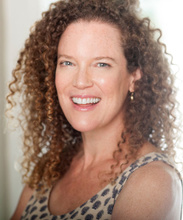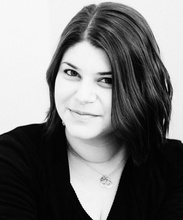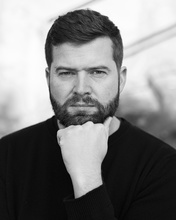The Center for New Music
David Gompper, director
Zack Stanton, interim director
Center for New Music Ensemble
Performing works by
Weesner, Britten, Weinberg, and Stark
Sunday, November 8, 2020 at 7:30pm
Voxman Music Building Concert Hall
Program
Lift High, Reckon — Fly Low, Come Close (2008) |
Anna WEESNER |
| Luciana Hontila, violin Adrian Gomez Hernandez, violoncello Yi Wang, piano Zack Stanton, conductor |
Elegy |
Benjamin BRITTEN |
| Donghee Han, viola |
Ember II (2018) |
Alyssa WEINBERG |
| Peter Grubisich, percussion Jordan McFarland, percussion Nick Miller, percussion Ben Stone, percussion |
Piano Quartet (2014) |
Christopher STARK |
| Luciana Hontila, violin Donghee Han, viola Adrian Gomez Hernandez, violoncello Yi Wang, piano Zack Stanton, conductor |
Program Notes
Anna Weesner
| Lift High, Reckon — Fly Low, Come Close
Quite often titles for pieces arrive on the sidelines of the composing process and somehow just seem right. This was not the case with this piece, whose title required a deliberate search after the piece was written. At a loss for some time, I finally decided to try to describe in very simple terms what I think the piece feels like, which is a way of thinking about what the piece is about, and I came up with the longish title, Lift High, Reckon — Fly Low, Come Close. There are two distinct musics in the first half or so of the piece — the very “lifted,” almost suspended, material of the opening and the fairly dry, “considered” (reckoned?) music initially presented by the piano. As the piece plays out, these two kinds of material grow and interact, resisting each other but also integrating in various ways. |

Playing the flute in the New Hampshire Youth Orchestra and the New England Conservatory Youth Chamber Orchestra as a teenager was a formative experience for Anna Weesner, nourishing a love of music that had begun with Suzuki method violin lessons at the age of five. Daughter of a fiction writer and a music teacher, composition was a natural discovery in high school and college. Anna maintains a lifelong relationship with the radio and the presets in her car are heavy on pop. Her recent output includes a set of songs called My Mother in Love, commissioned by Cygnus Ensemble for which she also wrote the text, and The Eight Lost Songs of Orlando Underground for clarinet quintet commissioned and premiered by the Lark Quartet with Romie de Guise-Langlois. Winner of a 2019 Independence Foundation Grant, the 2018 Virgil Thomson Award in Vocal Music as well as an Academy Award from the American Academy of Arts and Letters, she is also the recipient of a 2009 Guggenheim Fellowship and a 2003 Pew Fellowship in the Arts. She has been in residence at MacDowell, the Virginia Center, Weekend of Chamber Music, Songfest, Seal Bay Festival, the Wellesley Composers Conference, and Civitella Ranieri. Her music has been performed extensively by chamber groups, including the Daedalus Quartet, Prism Saxophone Quartet, Dolce Suono Ensemble, Peggy Pearson and Winsor Music, and Network for New Music, among others. She studied at Yale (B.A.) and Cornell (D.M.A.) and is the Weiss Professor of Music at the University of Pennsylvania.
Benjamin Britten
| Elegy for solo viola The untitled manuscript of this piece was written in pencil on one side of a single sheet of twenty-four stave score paper on August 1, 1930, the day after Benjamin Britten left school at the age of sixteen. “I didn’t think I should be so sorry to leave” he wrote in his diary at the time, but the nature of this music, perhaps written for himself to play, betrays his true feelings. (Note by Colin Matthews and Rosamund Strode) |
Alyssa Weinberg
| Ember II for percussion quartet When writing Ember, I fell into a ritual of lighting a particular candle every time I sat down to work. It was a candle that had carnelian stones in it, which are a warm burnt orange color. The title “Ember” comes from looking into this flame, the appearance of the stones in the candle, and the warmth of the energy I was trying to channel in the piece. My main interest in the piece was to explore gradually shifting colors and timbres, discovering different ways of interacting with the snare drum without it ever necessarily functioning as it was originally intended. Ember II is an expansion of material from Ember I, originally a piece for percussion duo. |

Composer Alyssa Weinberg (b. 1988) is best known for crafting visceral, communicative scores, which have been lauded for their “frenetic yet cohesive musical language” (icareifyoulisten) and “heavyweight emotional dimension” (backtrack). Alyssa finds collaboration deeply inspiring, and her music pulls concepts from her work with writers, dancers, and visual artists. A natural organizer and thought leader in her field, Alyssa founded duende, a series for experimental dance in Philadelphia, along with cellist Gabrial Cabezas and dancer/choreographer Chloe Perkes in 2013. Duende presents events in a variety of setting and alternative venues, emphasizing equality between movement and music with a deep exploration into the intersection of those two disciplines. Alyssa Weinberg’s 2019–20 season includes premieres and performances by Alarm Will Sound, the Momenta Quarete, and Pathos Trio. Her music has been commissioned and performed by some of the most accomplished artists and ensembles around the world, including Eighth Blackbird, So Percussion, yMusic, and the Aizuri Quartet, as well as the Minnesota Orchestra, Sandiego Symphony, Louisville Orchestra, and the New Jersey Symphony Orchestra. Alyssa has received commissions and awards from Chamber Music America, FringeArts, and the Pennsylvania Ballet, the Barnes Foundation, and the Curtis Institute of Music. Alyssa Weinberg received an Artist Diploma from the Curtis Institute of Music, an M.M in composition from the Manhattan School of Music, and a B.M. in composition and theory at Vanderbilt University. Her teachers have included Richard Danielpour, Donnacha Dennehy, David Ludwig, Steve Mackey, and Dan Trueman. Weinberg is currently a doctoral fellow at Princeton Universi
Christopher Stark
| Piano Quartet Piano Quartet is a three-movement work, approximately fifteen minutes in duration, which was written for the Los Angeles Piano Quartet and made possible by a grant from the Fromm Music Foundation. The first movement is based on my impressions of Assisi, Italy, which I visited in 2012. The movement’s development is based on transformations of what I consider to be “man-made” and “natural” — inspired by St. Francis’ teachings and in memory of English composer Jonathan Harvey. The opening has two principal man-made ideas: a long twelve-tone melody played at various points by the different stringed instruments (later translated into bell-like chords in the piano), and dense synthetic overtone series arpeggiated in the strings and piano — I call them “synthetic” because they are based on ratios other than Pythagoras’ Theorem. These ideas trade back and forth until high string harmonics are introduced which lead to a central meditation. This section is distinguished by string and piano techniques that highlight harmonics and overtones, and it is followed by a climactic statement of the natural overtone series. Brief and nostalgic recollections close out the movement. The second movement begins as a quirky and pointed gigue that ultimately comes unhinged and disintegrates into bouncing bows and austere piano chords. Icy versions of previous motifs follow and slowly accelerate toward a sudden echoing lament. The trajectory of this movement was unexpected for me, because it was written during the summer of 2014’s tumultuous events in St. Louis, where I live. I found it increasingly difficult to continue developing the spritely opening material when there was such intense injustice happening nearby. The unfastened form and crumbling development were my attempt to respond to this. The third and final movement is an arrangement of a previous work of mine titled Borrowed Chords. The original composition was for clarinet, violin, and piano, and due to its short duration (five minutes), it always felt like an orphan. I am glad to have finally found it a suitable home within this quartet. The title comes from an assignment I was given as a doctoral student at Cornell University, where I was asked to compose a piece using two four-note pitch collections; therefore, everything in this work is based on those two collections, as heard through various guises and transpositions. It is brisk, direct, and energetic. It is dedicated to my mentor, who gave me the assignment, Roberto Sierra. |

Christopher Stark (b. 1980, St. Ignatius, Mont.) is a composer of contemporary classical music deeply rooted in the American West. Having spent his formative years in rural western Montana, his music is always seeking to capture the expansive energy of this quintessential American landscape. Stark, whose music The New York Times has called, “fetching and colorful,” has been awarded prizes from the John Simon Guggenheim Memorial Foundation, the Fromm Foundation at Harvard, Chamber Music America, ASCAP, and the Barlow Endowment. Named a 2017 “rising Star” by the St. Louis Post-Dispatch, his music has been performed by such ensembles as Alarm Will Sound, Los Angeles Philharmonic, America Composers Orchestra, BIT20 Ensemble, Left Coast Chamber Ensemble, Momenta Quartet, Unheard of//Ensemble, No Exit New Music Ensemble, and the New Morse Code. In 2012, he was a resident composer at Civitella Ranieri, a fifteenth-century castle in Umbria, Italy, and in June of 2016, he was awarded a residency at Copland House. Recent highlights included performances at the 2016 Santa Fe Chamber Music Festival and at the Whitney Museum of American Art as part of the 2016 NY Phil Biennial. In 2018, he was in residence in Bergen, Norway, where he worked with musicians from the Bergen Philharmonic, and in 2020, he was in residence at the Bogliasco Foundation in Italy as the Aaron Copland Fellow in Music. His score for the geature-length film, “Novitiate,” premiered at Sundance in January of 2017 and was theatrically released by Sony Pictures Classis. His debut CD, Seasonal Music, was released in 2019 on Bridge Records.